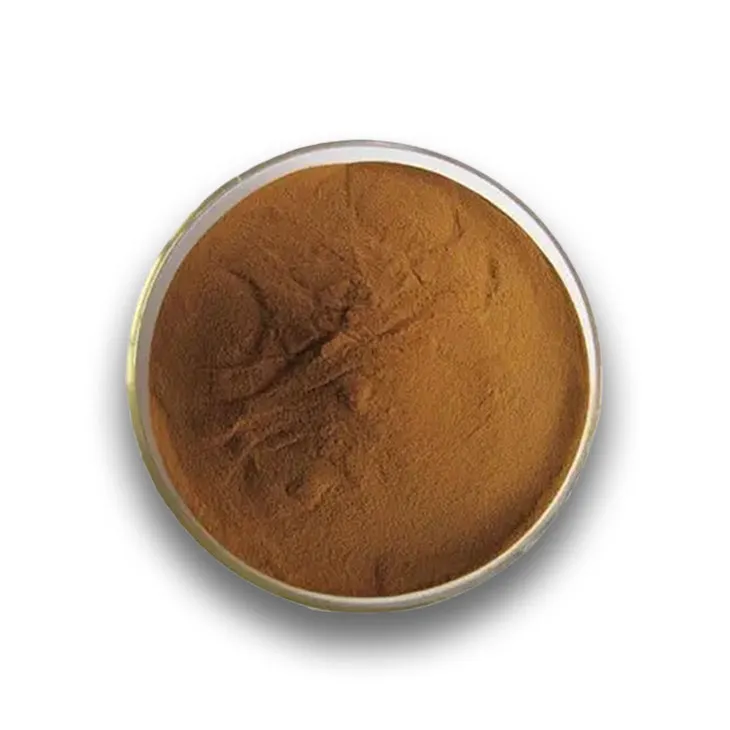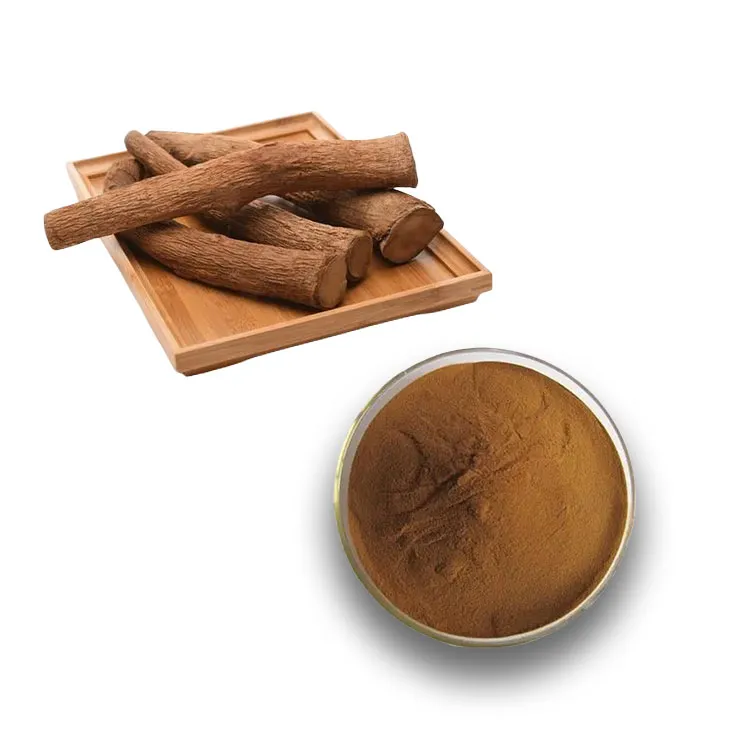- 0086-571-85302990
- sales@greenskybio.com
Tongkat Ali extract powder: Is the extract effective for weight loss?
2024-11-13

1. Introduction
In recent years, the search for natural substances that can aid in weight loss has been on the rise. One such substance that has caught the attention of many is the Tongkat Ali Extract powder, also known as Eurycoma longifolia extract powder, which is native to East - Malaysia. This article aims to explore whether this extract can be effective in the context of weight loss. We will look at its physiological effects, potential benefits, and possible drawbacks to provide a comprehensive understanding for those interested in its relation to weight management.

2. Understanding Tongkat Ali
Tongkat Ali is a plant that has been used in traditional medicine for centuries in Southeast Asia. It is known for its various medicinal properties.
2.1 Botanical Characteristics
Eurycoma longifolia is a small evergreen tree. Its roots are the main part used for extraction. The roots are rich in bioactive compounds that are believed to be responsible for its potential health effects.
2.2 Traditional Uses
Traditionally, Tongkat Ali has been used to boost male virility, increase energy levels, and enhance overall well - being. However, in modern times, its potential role in weight management has become an area of interest.

3. Physiological Effects of Tongkat Ali Extract
To understand its potential role in weight loss, it is essential to look at the physiological effects of Tongkat Ali Extract.
3.1 Metabolism
Some studies suggest that Tongkat Ali extract may have an impact on metabolism. It could potentially increase the basal metabolic rate (BMR). A higher BMR means that the body burns more calories at rest. This could be due to the activation of certain enzymes or hormonal regulation. For example, it may influence thyroid hormone function, which plays a crucial role in metabolism. However, more research is needed to fully understand this mechanism.
3.2 Fat Metabolism
There is evidence to suggest that Tongkat Ali extract may affect fat metabolism. It might enhance the breakdown of stored fat (lipolysis) and the subsequent utilization of fatty acids for energy production. This could be mediated through the activation of lipolytic enzymes in adipose tissue. Additionally, it may also influence the way the body processes and stores dietary fat, potentially reducing fat deposition in the body.
3.3 Appetite Regulation
Another aspect of weight management is appetite regulation. Tongkat Ali extract may play a role in this area. Some research indicates that it could affect the levels of hormones related to appetite, such as ghrelin and leptin. Ghrelin is known as the "hunger hormone," and leptin is the "satiety hormone." By modulating these hormones, Tongkat Ali extract may help to reduce appetite and prevent overeating. However, the exact mechanisms and the consistency of these effects need further investigation.

4. Potential Benefits for Weight Loss
Based on the physiological effects, there are several potential benefits of Tongkat Ali Extract Powder for weight loss.
4.1 Caloric Deficit Promotion
If Tongkat Ali extract can increase the BMR and reduce appetite, it can contribute to creating a caloric deficit. A caloric deficit is essential for weight loss as it means that the body is burning more calories than it is consuming. By increasing energy expenditure through a higher BMR and reducing food intake through appetite suppression, the extract could potentially help individuals lose weight.
4.2 Fat Loss
The effects on fat metabolism suggest that Tongkat Ali extract may specifically target fat stores in the body. This could lead to a reduction in body fat percentage, which is a key goal in weight loss. Losing fat not only helps in reducing body weight but also has positive impacts on overall health, such as reducing the risk of heart disease and improving insulin sensitivity.
4.3 Energy Boost
One of the traditional uses of Tongkat Ali is to boost energy levels. In the context of weight loss, increased energy can be beneficial. It can help individuals be more active, engage in more physical exercise, which further aids in burning calories and losing weight. For example, having more energy may encourage someone to take the stairs instead of the elevator or go for a walk during their lunch break.
5. Possible Drawbacks and Considerations
While there are potential benefits, there are also some possible drawbacks and considerations when it comes to using Tongkat Ali Extract Powder for weight loss.
5.1 Lack of Standardization
One major issue is the lack of standardization in the production of Tongkat Ali Extract Powder. Different manufacturers may use different extraction methods and quality control measures. This can lead to variations in the potency and composition of the extract. As a result, it is difficult to determine the exact dosage and effectiveness for weight loss.
5.2 Side Effects
Some people may experience side effects when taking Tongkat Ali extract. These can include insomnia, restlessness, and increased heart rate. These side effects may be more pronounced in individuals who are sensitive to the active compounds in the extract. In addition, long - term side effects are not well - studied, so there is a degree of uncertainty regarding its safety for continuous use.
5.3 Interaction with Medications
Tongkat Ali extract may interact with certain medications. For example, it could potentially interact with medications for blood pressure or diabetes. People who are taking medications should consult their doctor before using Tongkat Ali extract to avoid any adverse interactions.
6. Research and Evidence
The scientific research on Tongkat Ali extract and weight loss is still in its early stages.
6.1 Animal Studies
Some animal studies have shown promising results. For instance, in mice studies, Tongkat Ali extract has been associated with reduced body weight gain and improved body composition. However, it is important to note that results from animal studies may not always translate directly to humans.
6.2 Human Studies
There have been a limited number of human studies on the topic. Some small - scale human trials have reported positive effects on weight loss, such as a reduction in body fat percentage and an increase in energy levels. But these studies often have limitations, such as small sample sizes and short - term follow - up periods. Larger and more comprehensive human studies are needed to provide more conclusive evidence.
7. Conclusion
In conclusion, Tongkat Ali extract powder shows some potential for being effective in weight loss. Its physiological effects on metabolism, fat metabolism, and appetite regulation suggest possible benefits in promoting weight loss. However, there are also significant drawbacks and uncertainties. The lack of standardization, potential side effects, and limited research evidence all need to be considered. At present, it cannot be definitively stated that Tongkat Ali extract powder is an effective weight - loss aid. More research, especially large - scale human studies, is required to fully understand its role in weight management. Until then, individuals who are interested in using Tongkat Ali extract for weight loss should approach it with caution, consult their healthcare provider, and be aware of the potential risks and benefits.
FAQ:
Q1: What are the main components in East - Malaysia Eurycoma longifolia extract powder?
The main components in Eurycoma longifolia extract powder include various bioactive compounds such as eurycomanone, which is one of the most studied components. These components are thought to be responsible for its potential physiological effects.
Q2: How might East - Malaysia Eurycoma longifolia extract powder affect metabolism?
Some studies suggest that the extract may have an impact on metabolism. It could potentially increase energy expenditure by interacting with certain hormonal or metabolic pathways in the body. For example, it might influence thyroid function or fat - burning processes at a cellular level, but more research is needed to fully understand these mechanisms.
Q3: Are there any side effects associated with using East - Malaysia Eurycoma longifolia extract powder for weight loss?
Yes, there can be potential side effects. Some users may experience digestive issues like stomach discomfort, nausea, or diarrhea. In addition, it may also interact with certain medications. It's important to consult a healthcare provider before using the extract, especially if you have pre - existing health conditions or are taking other medications.
Q4: How should East - Malaysia Eurycoma longifolia extract powder be consumed for weight loss?
There is no standard recommended dosage for weight loss specifically. However, if considering using it, it should be taken as directed on the product label. It's often available in supplement form, and it's crucial not to exceed the recommended amount. Also, it should be combined with a healthy diet and regular exercise for potential weight - loss benefits.
Q5: Does scientific research support the effectiveness of East - Malaysia Eurycoma longifolia extract powder for weight loss?
Current scientific research is still limited and inconclusive regarding its effectiveness for weight loss. While some in - vitro and small - scale in - vivo studies show promising results in terms of its potential effects on metabolism and fat - related processes, large - scale, long - term human studies are lacking. More research is required to firmly establish its role in weight management.
Related literature
- The Potential of Eurycoma longifolia in Health and Wellness"
- "Bioactive Compounds in Eurycoma longifolia: A Review of Their Properties and Potential Applications"
- "Metabolic Effects of Eurycoma longifolia Extract: Current Understanding and Future Research Directions"
- ▶ Hesperidin
- ▶ citrus bioflavonoids
- ▶ plant extract
- ▶ lycopene
- ▶ Diosmin
- ▶ Grape seed extract
- ▶ Sea buckthorn Juice Powder
- ▶ Beetroot powder
- ▶ Hops Extract
- ▶ Artichoke Extract
- ▶ Reishi mushroom extract
- ▶ Astaxanthin
- ▶ Green Tea Extract
- ▶ Curcumin Extract
- ▶ Horse Chestnut Extract
- ▶ Other Problems
- ▶ Boswellia Serrata Extract
- ▶ Resveratrol Extract
- ▶ Marigold Extract
- ▶ Grape Leaf Extract
- ▶ blog3
- ▶ blog4
- ▶ blog5
-
Organic Tongkat Ali extract powder factory.
2024-11-13
-
How to make powder with ashwagandha extract.
2024-11-13
-
Rosehip extract manufacturers from China.
2024-11-13
-
The best cat's claw extract in nature.
2024-11-13
-
Chinese Dandelion Leaf Extract Suppliers.
2024-11-13
-
Coconut Water Powder
2024-11-13
-
Saponin Extract
2024-11-13
-
Lily extract
2024-11-13
-
Peppermint Extract Powder
2024-11-13
-
Medicinal Marshmallow Extract
2024-11-13
-
Konjac Powder
2024-11-13
-
Ginger Extract
2024-11-13
-
Garcinia Cambogia Extract
2024-11-13
-
Rosemary extract
2024-11-13
-
Citrus Aurantii Extract
2024-11-13





















